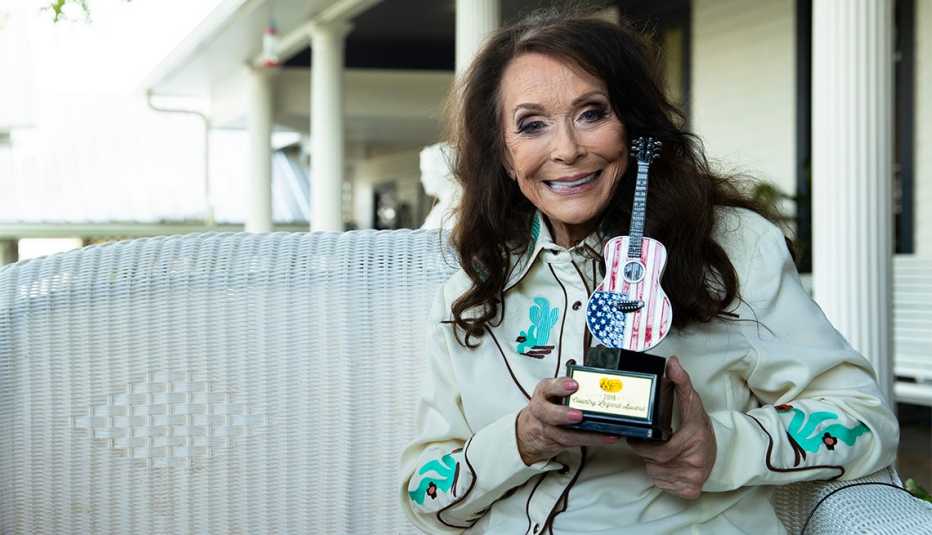AARP Hearing Center


A few weeks before her 89th birthday, Loretta Lynn just released her 50th studio album, Still Woman Enough. She's still got the brazen candor, folksy humor and honky-tonk authenticity that set her on the path to wealth and fame — an uphill destination for a girl born poor in a two-room cabin in the coal-mining town of Butcher Hollow, Kentucky. Married at 15, raising four children before 20, Lynn managed to crash the gates of Nashville's boys club with a string of defiant No. 1 hits: “Fist City,” “Don't Come Home A-Drinkin’ (With Lovin’ on Your Mind),” “Trouble in Paradise,” “Out of My Head and Back in My Bed” and “Love Is the Foundation.”
The centerpiece of the 13-track Still Woman Enough is her signature tune “Coal Miner's Daughter,” the title of her autobiography and the 1980 biopic starring Sissy Spacek. Lynn reinterprets six other hits, including “One's on the Way” (with Margo Price) and “You Ain't Woman Enough” (with Tanya Tucker). Reba McEntire and Carrie Underwood also join her on the new album, produced by her daughter Patsy Lynn Russell and John Carter Cash, the only child of Johnny Cash and June Carter Cash.
Though she's kept a low profile since a 2017 stroke and a 2018 fractured hip, Lynn shared her thoughts on the new album with AARP.
What keeps you going, and what inspired you to do this album?
Singing and writing are who I am. It makes me feel alive and happy. I am thankful I am still able to write what I think are good songs and share them with my fans.
You've said “Coal Miner's Daughter” is your favorite song. Why does it mean so much to you, and why did you remake it in spoken word form?
Well, “Coal Miner's Daughter” is the story of my life and started out as spoken word. It was my daughter Patsy and John Carter Cash's idea to record it that way. I love the way it turned out.
What have been the highest and lowest points of your career?
I think the highest point of my career was in the late ‘70s. I had No. 1 songs, a best-selling book and a movie made about my life. But I think it was also the lowest point for me as well. Life gets away from you so fast when you move fast. When I look back on that time, I can't help but feel sorry for myself because I didn't really understand all that was happening. I didn't get to enjoy it like I wished I would've.
How have you spent time in isolation during the pandemic, and what did you miss most?
I think like most everybody I miss seeing my family during the pandemic. I have a big family and it's been hard not being together. I also missed not having the grandkids running all over the place during Christmas and the holidays. I'm just ready for this to all be behind us.
You rose from poverty to become one of the biggest superstars in country music history. How would you advise young female country singers hoping to get a foot in the door?
My advice is don't give up. Not everyone's going to make it, but you might be that special someone who's just got to keep working at it. When you stop dreaming, you stop living.
Edna Gundersen, a regular AARP music critic, was the longtime pop critic for USA Today.
The Essential Loretta Lynn Playlist
Of Loretta Lynn's 86 solo singles, a whopping 51 reached the country singles chart Top 10, and 16 went all the way to No. 1. Here are 10 of her best, from her debut single in 1960 to a stirring ballad from 2016.
I'm a Honky Tonk Girl (1960)
The singer's debut single announced the arrival of a sassy, candid country ingénue steeped in Appalachian tradition.
Dear Uncle Sam (1966)
Lynn dodged flak with her Vietnam War protest song by addressing the topic from the emotional perspective of a wife worried about her soldier overseas. Strains of “Taps" suggest the story doesn't end well.
You Ain't Woman Enough (To Take My Man) (1966)
Lynn's strapping vocals and clever wordplay are center stage in this musical threat to the woman making moves on her man. She later revealed the song, and many others, were inspired by her cheating husband, Oliver “Doolittle” Lynn.
Don't Come Home A-Drinkin’ (With Lovin’ on Your Mind) (1966)
Marital troubles also gave rise to Lynn's first chart-topper, a gutsy brush-off that sparked controversy for its sexual overtones and sharply contrasted the mushy love songs expected of female country singers in that era. It marked the seventh time a solo female artist topped the country chart.
Fist City (1968)
Again, art imitated life in a gritty and humorous No. 1 hair-pulling hit directed at women who chased her husband while the singer was away on tour. She warns: You better move your feet/If you don't wanna eat/A meal that's called fist city.
Coal Miner's Daughter (1970)
Indisputably Lynn's best and most loved tune, this twangy yarn shares her hard-scrabble upbringing in six economic, nostalgic verses that yielded a hit movie and best-selling book.
You're Lookin’ at Country (1971)
Proud of her Butcher Holler background, Lynn celebrates cornfields, barnyard shovels and old-fashioned rural life in a song that gleefully shares, “This little girl would walk a country mile to find her a good ole slow-talkin’ country boy."
One's on the Way (1971)
Lynn perfectly captures the comedy and poignancy in the catchy, sardonic tune by Shel Silverstein about an overwhelmed pregnant mother in Topeka daydreaming about the glamorous lives of Raquel Welch and Elizabeth Taylor.
The Pill (1975)
An upbeat and powerful tribute to birth control, albeit for married women, “The Pill” was the most controversial song of Lynn's career. Many radio stations banned the song, but Lynn was pleased that her message of reproductive freedom had reached many remote rural regions.
Who's Gonna Miss Me? (2016)
A somber song with spare acoustic guitar and fiddle ponders an aching universal question. “I'd like to know I've left someone who's gonna miss me when I'm gone,” Lynn sings plaintively. In her case, the answer is, “Who isn't?"





































































More on entertainment
Tony Bennett's Battle With Alzheimer's
For four years, the legendary singer and his family have kept his secret. Now, they're breaking their silenceBridging Sound and Science: Music’s Role in Healing
Health experts explore how a song could become the prescription of the future
Queen of Rock 'n' Roll Tina Turner Dies at 83
The legendary singer spoke to AARP in 2020 about her life, her happiness and her health challenges